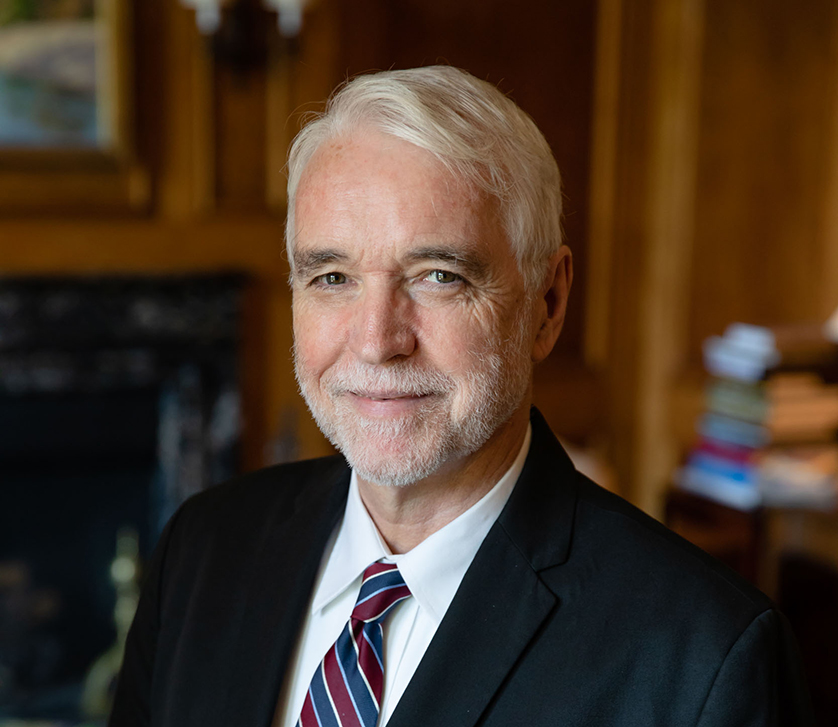UI president expects 300 to 500 new cases to start semester
Photo Courtesy of UI News Bureau/L. Brian Stauffer
University of Illinois President Timothy Killeen poses for a professional headshot. Killeen gave his annual address on Monday via Zoom, where he addressed varying topics including COVID-19.
January 27, 2021
The University of Illinois Senate’s Executive Committee met over Zoom on Monday for University President Tim Killeen’s annual address. During his address, Killeen discussed his hopes for the spring semester regarding COVID-19 testing, vaccinations, the university budget and a new partnership with the University of Toronto.
Killeen began his address by noting that, while COVID-19 vaccine distribution has begun in the community, the campus community must remain vigilant to minimize the spread of the virus during the spring semester. He also noted that the University’s SHIELD team — the body in charge of COVID-19 testing on campus — is concerned about the possible entry of the new coronavirus strain detected in the U.K. into the C-U community.
“There’s a light at the end of the tunnel, but there’s still a lot of darkness until we reach the end of the tunnel,” Killen said, referring to the months before the majority of the campus will be eligible for the COVID-19 vaccine.
Killeen emphasized the successes the university experienced during the fall semester. Among these successes included the completion of 1.1 million COVID-19 tests, no student hospitalizations or deaths due to the virus and the announcement of a 20 million grant for other universities to purchase access to the University’s SHIELD testing system. Among these universities include Notre Dame University, Indiana University and the University of Wisconsin-Madison.
Despite these successes, Killeen noted that he expects to see 300-500 new COVID-19 cases on campus during the beginning weeks of the semester.
Get The Daily Illini in your inbox!
Killeen also addressed the university’s budget. He noted that the Board of Trustees recently approved a tuition freeze for the sixth of seven years, along with a four-year price guarantee, meaning the price of tuition during a student’s freshman year will stay consistent for their entire academic tenure at the university.
This comes along with an 8% increase in the number of student applications compared to the number of applications submitted last year, which Killeen attributed to the success and publicity of the University’s COVID-19 testing facilities.
On the faculty side of the budget, Killeen noted that, despite the financial constraints the pandemic has put on the university, there have been nor faculty layoffs or furloughs — although there was no pay raise this year either. However, some faculty members opted for a “voluntary salary decrease.”
Killeen discussed a recently-launched partnership with the University of Toronto in Canada. On Oct. 29, the University of Illinois System, the Council of the Great Lakes Region and the University of Toronto signed a memorandum of understanding officially launching the binational Great Lakes Higher Education Consortium. The partnership was launched with the intention to strengthen higher-ed across the Great Lakes region and provide a platform for institutions of higher education to collaborate across borders on socioeconomic and environmental issues.
Killeen also discussed another international partnership between the University of Illinois at Chicago and Monterrey Institute of Technology in Mexico. This partnership was created to strengthen collaboration between faculty and students amongst the two universities.
Towards the end of the meeting, Chair of the Senate Executive Committee Robin Kar opened an opportunity for faculty senate members to ask Killeen questions and address any concerns.
Some concerns brought up by faculty included addressing student and faculty mental health and morale, encouraging fellow faculty members to listen to students and be flexible during this second hybrid semester, emphasizing a need for competitive pay-increase to retain faculty members and to show support for graduate students.
Kar also opened an opportunity for public comment. However, there were no public comments to be made. The Senate meets every Monday and is available to the public through live stream.







